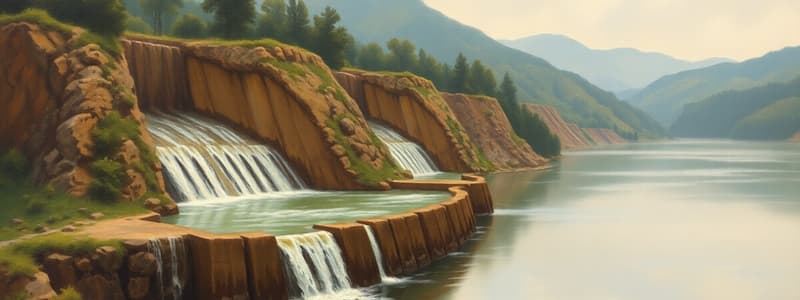Podcast
Questions and Answers
What is a key factor in the design of earthen dams?
What is a key factor in the design of earthen dams?
- The color of the soil used
- Selection of a suitable site (correct)
- The depth of the riverbed
- Type of vegetation above the dam
Which component is NOT typically associated with spillways?
Which component is NOT typically associated with spillways?
- Seepage filters (correct)
- Weirs
- Gates
- Chutes
What primarily affects the forces acting on gravity dams?
What primarily affects the forces acting on gravity dams?
- Type of construction material used
- Width of the spillway opening
- Flow rate of the upstream river
- Hydrostatic pressure from water (correct)
Which aspect is crucial for slope protection in earthen dams?
Which aspect is crucial for slope protection in earthen dams?
What is the focus of stress analysis in the context of gravity dams?
What is the focus of stress analysis in the context of gravity dams?
Study Notes
Earthen Dams
- Classification: Earthen dams are categorized based on their construction materials and design, including zoned embankment dams, homogeneous embankment dams, and rockfill dams.
- Design Considerations: Factors such as foundation conditions, seismic activity, seepage control, and slope stability are crucial for designing earthen dams.
- Site Selection: Ideal sites for earthen dams possess suitable foundation materials, sufficient space for construction, and good access for transportation and materials.
Seepage and Slope Protection
- Seepage Estimation: Analyzing the permeability of dam materials and surrounding soil is essential to predict seepage flow and potential erosion.
- Seepage Control: Measures like cutoff trenches, drainage blankets, and filter layers are implemented to manage seepage and ensure dam stability.
- Slope Protection: Protecting dam slopes from erosion and weathering entails using materials like riprap, vegetation, or concrete linings.
Gravity Dams
- Forces: Gravity dams experience forces from water pressure, self-weight, earthquake loads, and wind pressure.
- Failure Causes: Common failure modes include overtopping, foundation instability, sliding, and cracking due to excessive stress.
- Stress Analysis: Engineers conduct sophisticated stress analyses to ensure dam stability and determine the required structural components and design parameters.
- Elementary and Practical Profile: The design of gravity dams involves creating a profile that balances the forces acting on the structure and ensures adequate stability.
- Economic Height: Determining the most economical dam height considers factors like construction costs, reservoir capacity, and potential benefits of the dam.
Spillways
- Spillway Components: Typical spillway elements include a crest, a stilling basin, a discharge channel, and control gates or structures.
- Gate Types: Various spillway gates are used for controlling the flow of water, such as radial gates, slide gates, and roller gates, each with specific advantages and disadvantages.
Studying That Suits You
Use AI to generate personalized quizzes and flashcards to suit your learning preferences.
Description
This quiz explores the classification, design considerations, and site selection for earthen dams. It also delves into seepage estimation and control measures essential for ensuring stability and protection of dam slopes against erosion. Test your knowledge on these critical aspects of earthen dam construction!


